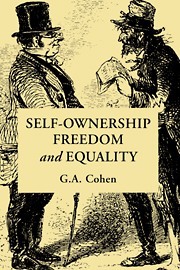Book contents
- Frontmatter
- Contents
- Preface
- Acknowledgements
- Introduction: history, ethics and Marxism
- 1 Robert Nozick and Wilt Chamberlain: how patterns preserve liberty
- 2 Justice, freedom, and market transactions
- 3 Self-ownership, world-ownership, and equality
- 4 Are freedom and equality compatible?
- 5 Self-ownership, communism, and equality: against the Marxist technological fix
- 6 Marxism and contemporary political philosophy, or: why Nozick exercises some Marxists more than he does any egalitarian liberals
- 7 Marx and Locke on land and labour
- 8 Exploitation in Marx: what makes it unjust?
- 9 Self-ownership: delineating the concept
- 10 Self-ownership: assessing the thesis
- 11 The future of a disillusion
- Bibliography
- Index of names
- Subject index
3 - Self-ownership, world-ownership, and equality
Published online by Cambridge University Press: 29 August 2009
- Frontmatter
- Contents
- Preface
- Acknowledgements
- Introduction: history, ethics and Marxism
- 1 Robert Nozick and Wilt Chamberlain: how patterns preserve liberty
- 2 Justice, freedom, and market transactions
- 3 Self-ownership, world-ownership, and equality
- 4 Are freedom and equality compatible?
- 5 Self-ownership, communism, and equality: against the Marxist technological fix
- 6 Marxism and contemporary political philosophy, or: why Nozick exercises some Marxists more than he does any egalitarian liberals
- 7 Marx and Locke on land and labour
- 8 Exploitation in Marx: what makes it unjust?
- 9 Self-ownership: delineating the concept
- 10 Self-ownership: assessing the thesis
- 11 The future of a disillusion
- Bibliography
- Index of names
- Subject index
Summary
… the original ‘appropriation’ of opportunities by private owners involves investment in exploration, in detailed investigation and appraisal by trial and error of the findings, in development work of many kinds necessary to secure and market a product – besides the cost of buying off or killing or driving off previous claimants.
(Frank H. Knight, ‘Some Fallacies in the Interpretation of Social Cost’)1. Anarchy, State, and Utopia is routinely characterized as libertarian, an epithet which suggests that liberty enjoys unrivalled pride of place in Nozick's political philosophy. But that suggestion is at best misleading. For the primary commitment of his philosophy is not to liberty but to the thesis of self-ownership, which says that each person is the morally rightful owner of his own person and powers, and, consequently, that each is free (morally speaking) to use those powers as he wishes, provided that he does not deploy them aggressively against others. ‘Libertarianism’ affirms not freedom as such, but freedom of a certain type, whose shape is delineated by the thesis of self-ownership.
In so designating what is central and what is derivative in Nozick, I am denying that he thinks that freedom comes first and that people qualify as self-owners because lack of self-ownership means lack of freedom.
- Type
- Chapter
- Information
- Self-Ownership, Freedom, and Equality , pp. 67 - 91Publisher: Cambridge University PressPrint publication year: 1995
- 2
- Cited by



